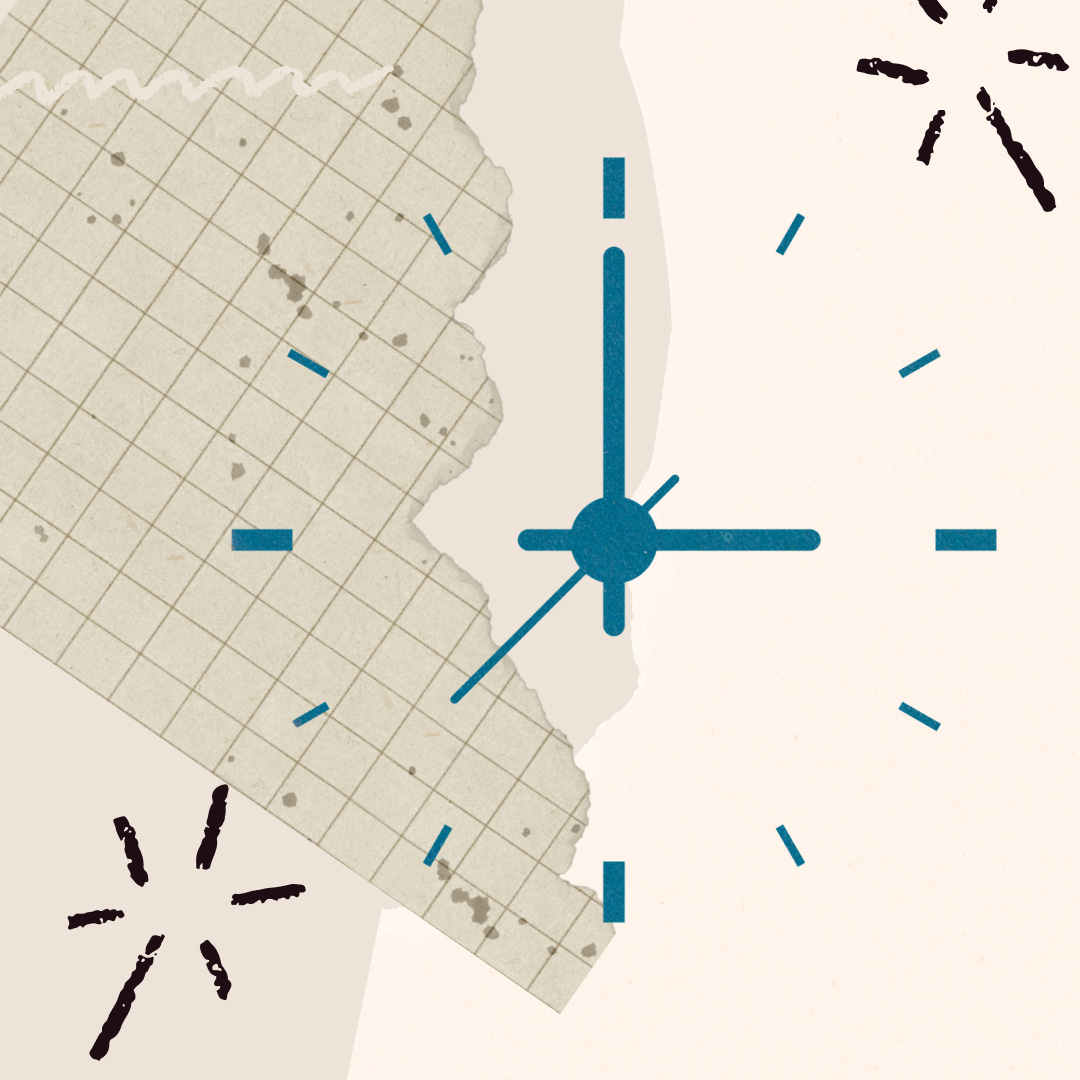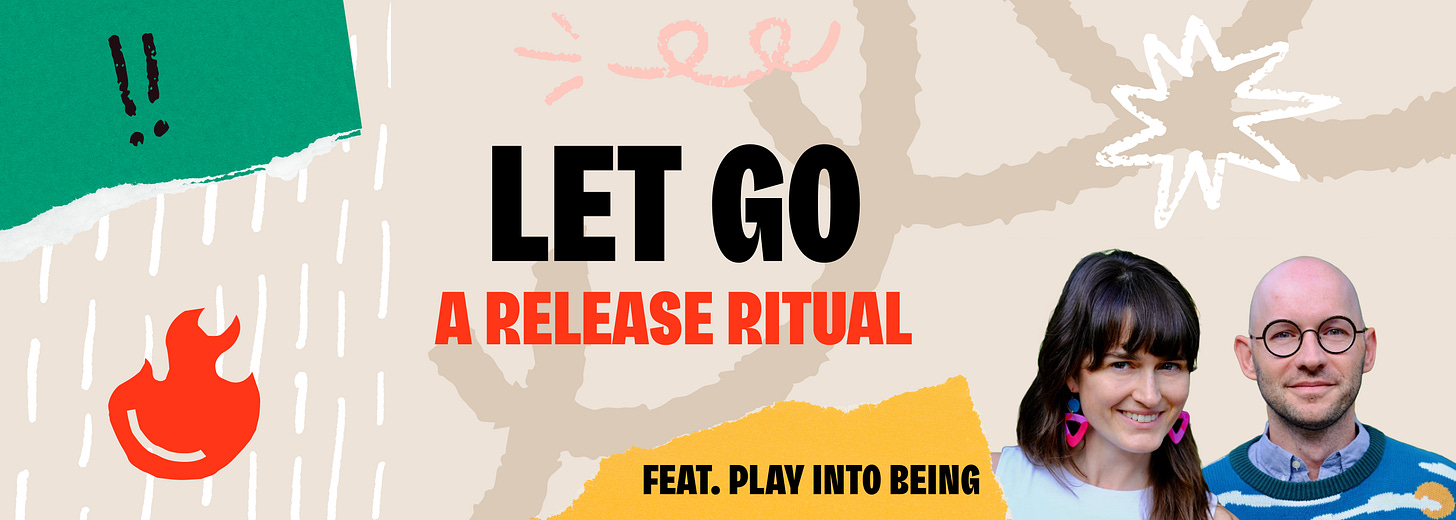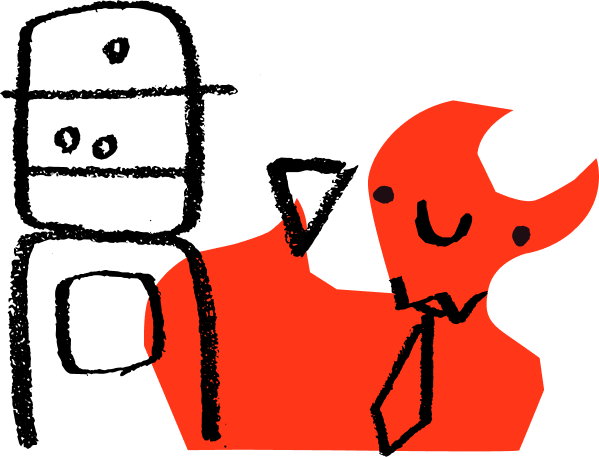The quiet art of turning your Job-Job into your Day Job
A practical guide to mentally downsizing your career so your creativity can breathe
Hi there! You’re reading the Bonfire newsletter from Kevan Lee & Shannon Deep. Each week, we highlight brand, marketing, and creative learnings from our experience as in-house marketers turned agency owners who think a lot about creativity, our relationship to work, and how all of that impacts our identities. We’ll also feature insights from our digital community of super smart folks (which you’re welcome to join).
Wishing you a great week!
Check us out on Robin Zander’s podcast, Snafu, talking about how we build a meaningful business!
Day Jobs get a bad rap.
If you’re a creative person or an entrepreneur, the idea of having a Day Job—labor that sustains your life and funds whatever pursuit you really want to be doing—is often tainted with the shame of compromise and implications of failure.
The Day Job seems to say that if you were actually successful at what you really wanted, then you wouldn’t need it. Poor you. How sad!
But what is missing from this attitude, of course, is nuance, subtlety, and the acknowledgment of the fact that transitions, transformations, and metamorphosis are processes. Becoming takes time! And while you become—become an artist, a writer, an entrepreneur, a stay-at-home-parent, a farmer, or any other thing that isn’t having a full-time salaried job working mostly for the benefit of someone who isn’t you—you need support.
Don’t let the binary thinking that upholds capitalist fairytales get you down. (There’s a reason we culturally fixate on the fantasy of overnight success, you know?)
But I actually want to back up a little in this employment equation. I want to talk to all the folks out there who don’t yet have a Day Job, but just a regular old Job-Job, a 9-to-whatever that you still think of as your primary work identity. I’m talking to you if your Job-Job still pays the bills. It still looks good on LinkedIn. It still gives you healthcare, stability, structure, and maybe even a sense of belonging at the monthly happy hour, or a feeling of accomplishment when you nail your QBR presentation.
…and you have a creative project or a side hustle or something sitting in your garage that calls to you on evenings and weekends. Because to even get to the point of having a Day Job, there comes a squishy decision moment where you have to make the call—not to quit the Job-Job. Not burn it all down. Not run off to Bali to write your novel in a hammock (unless you want to). But there is a time to demote your Job-Job to Day Job. To reposition it emotionally, mentally, spiritually, energetically. So that you can invest the best of yourself in the creative pursuit that’s been tugging at your sleeve.
There is a point where it can be healthier—not riskier—to quietly demote your Job-Job into your Day Job.
Here are a few signs it might be time. (And tips on how to do so below!)
1. You notice a shift or disparity in your enthusiasm compared to last month, quarter, year, etc.
You’re not disengaged. You’re still doing good work, still collaborative, communicative, and occasionally even delighted.
But the “Where do you see yourself in 5 years?” performance review question and the “Here’s why it’ll look good for you to crush our Q3 targets” spiel your manager keeps on about no longer resonate or motivate. You can see the next rung on the ladder, but you don’t care to grab it. Last year, or maybe even last quarter, you were angling for a promotion, for a learning opportunity, to collect accolades or experiences that would look great on LinkedIn.
Now? It’s like you’re watching a movie about your job—and you aren’t even the main character.
Meanwhile, your “side project” won’t leave you alone. It’s haunting you. You’re thinking about it in the shower, on the metro, while your most annoying coworker is Slacking you. And when you talk about your work to loved ones, you’re only complaining.
Basically, your enthusiasm disparity is becoming too big to ignore.
What this usually means: Your motivation hasn’t disappeared—it’s just being rerouted. And ignoring that rerouting tends to breed resentment toward your job, toward yourself, toward anything blocking the other thing that’s trying to get your attention!
2. Your job starts draining your energy instead of giving it structure
Your job doesn’t have to be your soulmate, but ideally it should offer one of two energetic resources: momentum or scaffolding.
Momentum gives you energy by moving you toward something. Think: a certain level of financial stability, novel experiences you crave, skills you want to build, etc.
Scaffolding gives you energy by providing stability, like a savings milestone/financial safety net, a clear and boundaried schedule or a super flexible schedule, healthcare, paid vacation time, etc.
If it feels like your job is currently giving you neither—and you’re coming home too depleted to put any energy into your creative life—it might be time to reclassify it as a Day Job. (Caveat: You might not be able to fix a fast-paced and demanding workplace culture, but you can choose not to perpetuate that for yourself as much as possible!)
What this usually means: You’re over-invested or being forced to over-invest energetically and/or emotionally in work, or you no longer need the momentum or scaffolding your job previously provided. That’s a good sign to reevaluate its role in your life!
3. You’re performing a version of yourself at work that feels increasingly distant
This is a quiet but powerful sign.
You notice that Work You and Real You have drifted apart. The version of you in your creative life is sharper, braver, more expansive, more joyful, or more peaceful. The version of you at work is competent, polite, efficient, agreeable, pleasant, professional. Work You is…fine.
You’re not being fake; you’re being functional. Or maybe you’re only being a fraction of who you really are. And you’re definitely not being the version of yourself you like the most! There might have always been a gap between Real You and Work You, but now it’s starting to chafe.
What this usually means: Your creative identity has already moved on and rooted elsewhere. Even subconsciously, you’re not looking for your job to be the place you self-actualize anymore, so it’s not where you feel like yourself. (But it can be the place that pays you while you do that elsewhere!)
How to mentally and emotionally “downgrade” your job to a Day Job (in a healthy way!)
This isn’t about checking out—it’s about recalibrating. The goal is to reduce the emotional/mental load so you can reallocate that energy toward your creative pursuit without torching something that’s providing for your life.
Here’s what that might look like in practice:
1. Redefine success at work
Shift from outperforming to performing well enough to maintain trust. Ask yourself: What is the minimum viable version of work that allows me to keep my reputation solid? You don’t need gold stars when you’re building something bigger elsewhere. And you might even find that you’ve been waaay overfunctioning this whole time. (Bonus: Peruse last week’s Substack about 50 different ways to define success to find new things to hang your hat on!)
2. Create a psychological boundary
This is perhaps the true power of the Day Job. It creates psychological hierarchy! Try this manta: “This is just my Day Job.”
Say it before meetings with your manager. Say it after Slack pings from that annoying coworker. Say it when you feel your heart rate spike because someone used the phrase “Q4 OKRs.”
When you remind yourself that your real work is elsewhere, you’ll be surprised at how easily you can do this next one…
3. Cap the emotional labor
Start paying attention to and stop volunteering for all the invisible work: emotional caretaking, cultural glue, unofficial mentoring, conflict smoothing, morale repair. You absolutely can be a good colleague without being the office therapist!
4. Invest your “excess excellence” elsewhere
That extra hour of polish you would normally give a presentation? Now you’re using it to outline the next chapter of your novel. The extra tasks you would have picked up because Brian went on vacation and didn’t have a solid hand-off plan? What a great time to take an online seminar on setting up your personal website!
The excess excellence you were giving to your Job-Job? Your Day Job doesn’t need all that! Isn’t that awesome?
5. Schedule your creative pursuits like a job, too
The great thing about Day Jobs is that they are, categorically, less important than your creative pursuits. Which gives you permission to treat your creative pursuits seriously.
So schedule time to dedicate to it! Not just “after work,” or “if I have time this week.” Now, you can put it on your calendar with the same seriousness you’d give a client meeting and protect it without apology.
The bottom line: Demoting your Job-Job to your Day Job rather than quitting outright isn’t a failure; it’s a necessary step to set your creative pursuit up to actually succeed. And sometimes the bravest, most strategic career move isn’t quitting, but rather quietly, intentionally shifting your center of gravity toward the life you’re trying to build.
Over to you
Have you made the Job-Job to Day Job transition? Ever transitioned from Day Job back into Job-Job? (I have!) Tell us about your experiences in the comments—the joys, the challenges, the self-doubt, and triumphs!
Events, resources, and more
Free Campout event 🗓️
Let Go: A Release Ritual - RSVP HERE | Open to all
with Play Into Being’s Kristen Pavle and Dave Gorum
Join us for a free 60-minute workshop to practice the art of letting go as we usher out the year. Learn a simple release ritual you can use again and again, swap stories with others, a move into 2026 with more creative energy.
But wait! There’s more…
Wanna hang out?
Reservations are OPEN for our next retreat in April 2026! Come chill in the French countryside while you explore your values, your inspiration, and your love of fine cheeses.
Wanna be friends?
If you love this newsletter and wish it were more interactive, you’re in luck! Join us over in Campout, our digital community for creative marketers and the creative curious.
Wanna work with us?
If you need help with brand strategy and storytelling, fractional brand and marketing leadership, and bringing your brand strategy to life in impactful ways, send us an email at hello@aroundthebonfire.com to get in touch.
As always, you can find us on LinkedIn, Instagram, and Threads.






